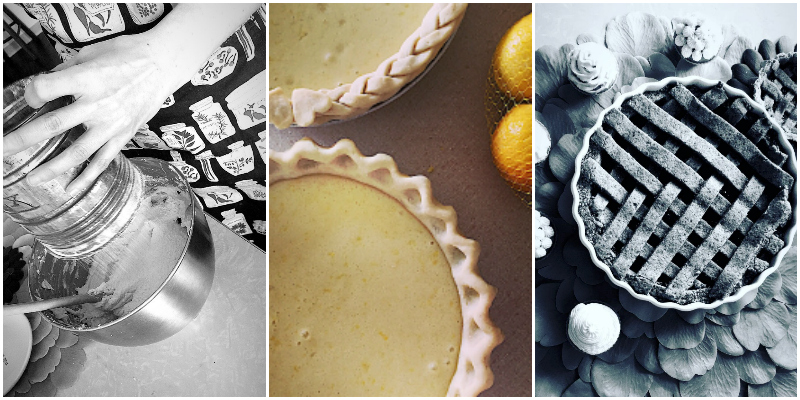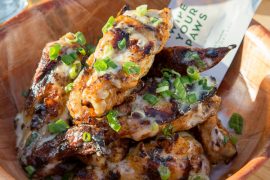By Monica O’Connell | Photos by Rachel Werner and Monica O’Connell
I LOVE CAKE, but sometimes only pie will do. And summer’s abundance followed by fall’s harvest often demands this delectable dessert. Between my CSA share and the Dane County Farmers’ Market, I scored raspberries, cherries and blueberries so sweet that they barely needed processing—or sugar—to make filling. October and November are also prime time for pie, particularly sweet potato, pecan and a classic Southern chess, threaded with saffron and lemon zest. And with this many delicious options, the trickiest part is often creating the perfect crust to complement them.
It doesn’t help that pie crust is one of those topics—like whether or not sugar belongs in cornbread (it doesn’t, really)—that seem to encourage people to draw hard, impenetrable lines between butter and lard. But renowned chef Edna Lewis included several pastry crust recipes in her book “In Pursuit of Flavor,” noting, “Every time I make it, I discover something else, some new trick or way to combine the ingredients to make a crust that tastes just right with a particular filling.” Though she seemed to prefer lard, which “gives a crispy crust, richer than butter,” with mincemeat, juicy berries, apples and sweet potatoes, Lewis opted for butter crusts with lemon and “light tasting fruit” like plums and persimmons.
The gift she imparts is one of freedom: flexible techniques that respect the pie—and pantry—at hand along with a reminder to enjoy the process as much as the outcome. She emphasized “one of the nicest things about pie crust is that you can always patch it if it tears. The filling will hide any imperfections.” What an ideal mindset for seasonal baking!
Curtis & Cake’s Pie Crust Recipe
Ingredients
- 3 C. unbleached all-purpose flour
- 12 Tbsp of high fat butter
- 1/3 C. leaf lard
- 1 tsp. kosher salt
- 1 Tbsp sugar
- 7-8 Tbsp ice water
Cut the butter into cubes before placing it and and the lard in the freezer until very cold. Combine flour, sugar and salt in a bowl. Work cold lard into flour mixture with a large fork or pastry blender. Continue until it is the texture of cornmeal with a few larger pieces, then add butter to bowl. Run your hands under cold water and pat dry before working butter with fingers in a pinch/rub motion. Keep going to achieve the consistency of very course sand in evenly distributed, fingernail-sized flakes. With a few gentle kneads, add enough ice water for dough to just come together. Form the dough into two even disks. Wrap tightly in plastic and chill at least an hour, although preferably overnight.
Monica O’Connell is the owner of Curtis & Cake. curtisandcake.com.




Comments are closed.